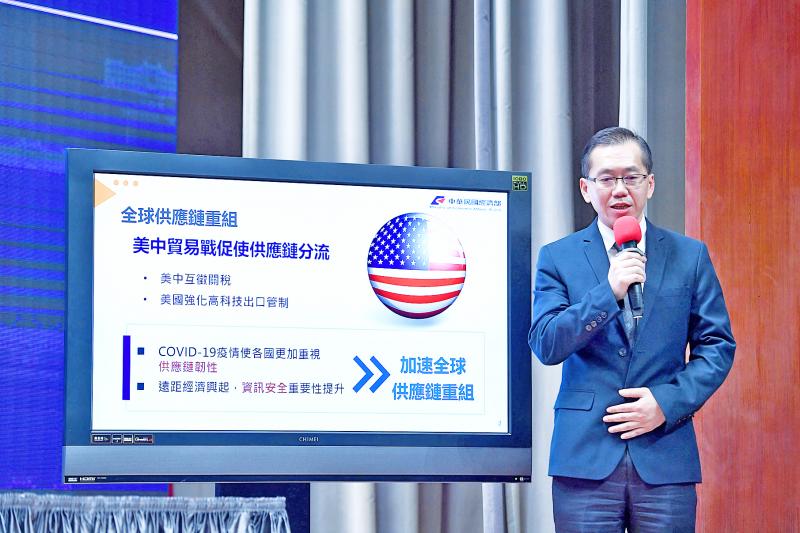Taiwan is eager to bolster cooperation with the US as the global supply chain undergoes restructuring, especially in the areas of semiconductors, communications, artificial intelligence (AI), green energy and precision healthcare, Premier Su Tseng-chang (蘇貞昌) said yesterday at a weekly Cabinet meeting.
His remarks followed a report by the Ministry of Economic Affairs on Taiwan-US partnerships in an era of global supply chain restructuring.
He instructed the ministry and other agencies to promote economic dialogue with the US, and to make concrete plans to achieve cooperation in strategic areas.

Industrial Development Bureau Director-General Yang Chih-ching details US-Taiwan partnerships within the global supply chain during a news conference after a Cabinet meeting in Taipei yesterday.
Photo: CNA
The US Department of State on Aug. 31 announced that the US and Taiwan would launch an Economic and Commercial Dialogue to be led by US Undersecretary of State for Economic Growth, Energy and the Environment Keith Krach, and “preparatory talks” were held during the undersecretary’s two-day visit last month.
Su said that the deepening of Taiwan-US economic ties and reorganization of the global supply chain are two of the government’s most important policy goals.
He highlighted four strategic areas: semiconductors, communications, AI and other cutting-edge technologies; green energy and innovative industries; healthcare industries; and development of the global market.
Cooperation would enormously benefit the two nations, Su said, citing estimates by industry experts that these areas would help the US to generate hundreds of billions of dollars in additional value, as well as hundreds of thousands, or even millions, of job opportunities.
Stepping up economic cooperation has become a hot topic in Taiwan and the US, Su said, adding that several US lawmakers, government departments and business groups have called on US President Donald Trump’s administration to initiate bilateral trade agreement negotiations with Taiwan.
These voices in the US not only reflect the extensive support that the US has for Taiwan in the public and private sectors, but also highlights that Taiwan-US economic cooperation is a mutually beneficial matter, he said.
If Taiwan’s advantages in semiconductor manufacturing were further enhanced by the US’ capabilities in technology and research and development — through trade, investment and the reorganization of the global supply chain — huge economic benefits could be expected, he said.
Taiwan Semiconductor Manufacturing Co’s (台積電) plans to set up factories in the US are a textbook example of such strategic cooperation, he added.
A rapidly changing global economic and trade environment has made supply chain reorganization an unstoppable trend, Su said, adding that this is the best time for Taiwan and the US to bolster economic ties.
Deepening Taiwan-US cooperation would not only help the US to achieve its goal of “bringing manufacturing back to the US,” it would also consolidate Taiwan’s position in the global supply chain, he said.
https://www.taipeitimes.com/News/front/archives/2020/10/23/2003745636